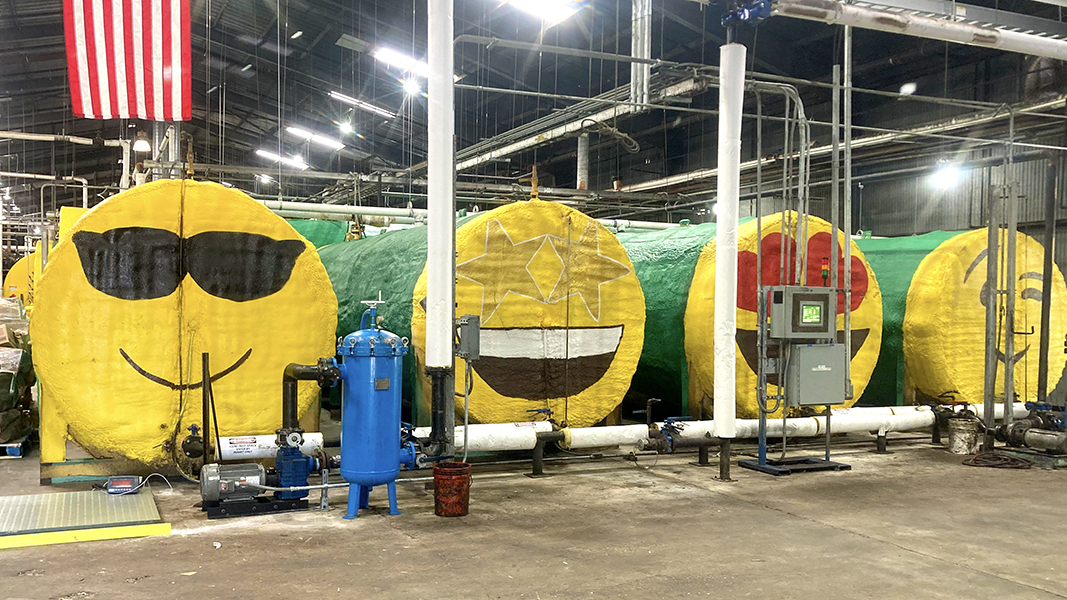Top: Green Energy Biofuel processes used fats, oils and grease and sells the refined oil for manufacturing biodiesel and other renewable biofuels.
Nora Goldstein
Joe Renwick got his feet wet in the biofuel business when he bought 55-gallon drums and water heaters to make biodiesel in his garage in North Augusta, South Carolina to fuel his Chevy diesel pickup truck. In 2008, he and a college friend started Midlands Biofuels in Winnsboro (SC), a local fats, oils and grease (FOG) collector and biodiesel producer. That partnership ended in 2011 and Renwick’s wife, Beth, joined the company. In 2016, Midlands Biofuels expanded its business area to Tennessee by purchasing a second used oil processing plant in Knoxville. With this acquisition came the decision to change the company name to Green Energy Biofuel (GEB).
The volatility of the biodiesel industry led Renwick to transition from being a used oil recycler/biodiesel manufacturer to a refiner of FOG to remove the impurities. The refined product is sold for manufacturing biodiesel, renewable diesel, sustainable aviation fuel, and marine biofuel. “GEB’s core business is the collection and processing of FOG to be sold to the biofuel market for the production of fuels,” explains Erika Coman, GEB’s Organizational Change Manager. “Our feedstock sources range from households to food processing plants, as well as other grease collectors who do not have the capacity or equipment needed to process FOG as we do.”
In the summer of 2018, a large-scale processing plant was purchased near Warrensville in Aiken County (SC). The new plant has capacity to process 60 million gallons/year of used cooking oil. GEB collects used oil throughout South and North Carolina, Georgia, and eastern Tennessee, with outreach via rail hauling across the U.S. All used oil refining is done in Warrensville, where there is a rail spur on the property, just south of the largest and well-manned switching yards in the area. “Having a private rail spur allows us to not only ship the finished biofuel feedstock to customers across the country, it also makes it possible to bring in waste for processing,” explains Renwick. “The rail spur results in a 40% savings in shipping costs — up to 25,000 gallons/load can be transported in rail tanker cars versus getting only 6,200 gallons/tractor-trailer tanker over the highway. We service large-scale food manufacturers who can ship waste to us via rail or truck. In addition to FOG, our plant processes animal fats (chicken, beef, pork), DAF sludge, emulsions, and wastewater high in FOG content.”
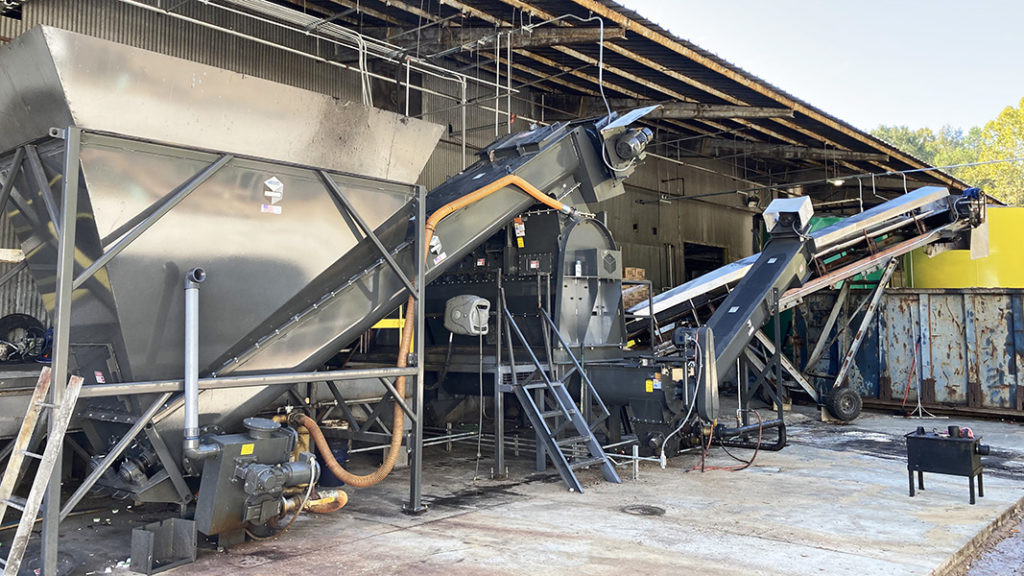
A Scott Equipment Turbo Separator was installed at the Warrensville plant earlier in 2022 to process packaged goods arriving by rail and truck.
In 2022, GEB purchased food waste depackaging equipment for the Warrensville plant. Packaged goods arriving by rail and truck are processed in a Scott Equipment Turbo Separator. After depackaging, oil-rich foods like mayonnaise and salad dressing are processed in GEB’s oil recovery system, which isolates the water, sludge and oil. The water is treated, the sludge is composted and the oil is upcycled. Recovered packaging, e.g., plastics and cardboard, are recycled at a facility in Columbia (SC).
Composting Facility Acquisition
Used cooking oil from restaurants and other food service establishments has water and cooked food particles mixed with oil. GEB’s primary outlet for the recovered solids after refining was landfill disposal. As the company grew, the volume of solids requiring disposal increased as well. “We started looking into different options and stumbled upon composting in 2020 when ReSoil Compost, a 4-acre facility in Elgin (SC), came on the market,” says Renwick. “Purchasing ReSoil was an easy decision to make. Significant site improvements were necessary to get to the point where we could run our composting process efficiently.” The company recently completed an upgrade that involved bringing in 500 tons of rock, fill dirt, and liner to grade out the site to prepare a large space for windrow composting. Drainage and watering systems were installed inside the building on the site, along with a rainwater collection system.
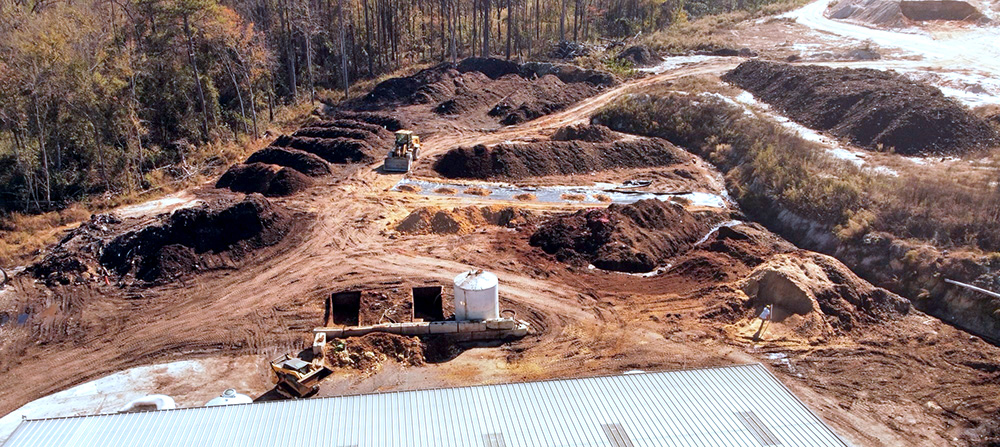
Significant improvements were made to the ReSoil Compost site, including filling and regrading the outdoor area to accommodate windrow composting. Photos courtesy of ReSoil
The original owners, who opened ReSoil in 2013, were receiving some food waste from local warehouses, schools and a nearby university. The site has a Class III composting permit from the South Carolina Department of Health and Environmental Control (DHEC). Allowed feedstocks include land clearing debris; yard trimmings and pre and postconsumer food waste, including meat, fish and dairy; sludges, solids and wastewater from used oil refining; butcher waste; and hemp by-products (flower, oil and woody residues). “ReSoil is permitted as a hemp handler and transporter,” explains Matt Renwick, facility manager. “Hemp farmers can use composting for hemp waste disposal as an alternative to incineration.”
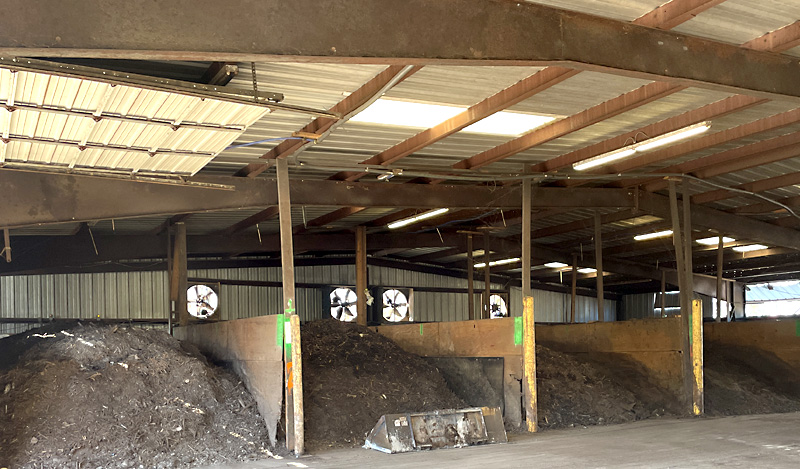
Positively aerated static piles in the bays are covered with wood chips and screened overs to treat odor emissions.
ReSoil Compost utilizes two composting methods: indoor, positively aerated static piles and outdoor turned windrows. Some piles start out inside and then are moved to the outdoor windrows for the curing phase. Each bay inside the building has two large pipes with aeration holes; fans blow air up through the piles. Wood chips and screened overs are layered on the top of the aerated piles to treat odor emissions. “We are fortunate in that our facility is in an industrial area, next to a landfill,” notes Sam Wooten, ReSoil’s Operations Coordinator.
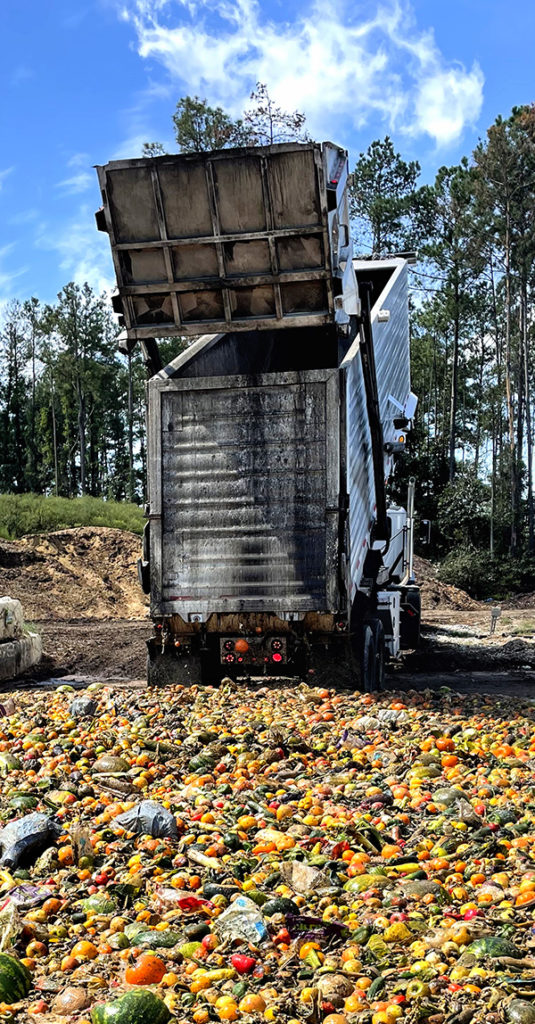
Food waste is tipped into a pit, then mixed with ground land clearing debris, yard trimmings and wood chips.
The tipping fee at the neighboring landfill is around $40/ton, with added environmental surcharges. The truck tipper at the landfill is unable to tip a standard 53-foot tractor trailer, notes Matt Renwick. “So if a 53-foot refrigerated truck full of lettuce got rejected at the loading dock of a produce warehouse due to spoilage, the load can’t go to the landfill next to us. ReSoil Compost offers a way to unload and compost the product.” Tipping fees at ReSoil vary depending on feedstock type, he adds. “Our pricing differs due to the wide variety of items we can accept, including liquids, raw meat and hemp. We also offer emergency disposal, solidification, unloading and depackaging.”
The compost is STA-certified (US Composting Council Seal of Testing Assurance). The company custom blends soil mixes, which include a topdressing and a turf product. ReSoil sells compost at its facility and also offers delivery. “We have a tractor trailer that can haul 27 cubic yards (cy) of compost and a small residential sized dump truck that can transport up to 6 cy at a time,” says Wooten. “We are also in local nursery and landscaping stores in bulk. ReSoil plans to have a line of bagged products ready for sale by Spring 2023.”


